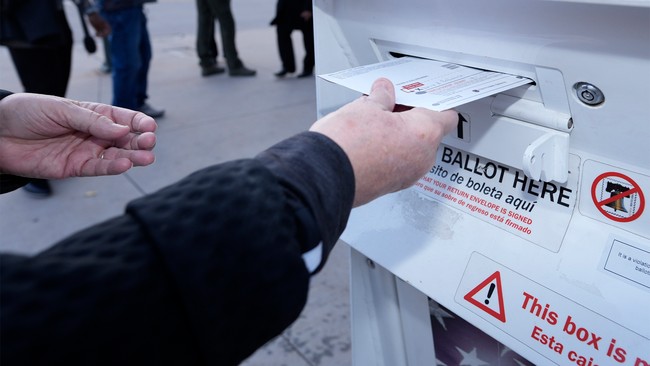
In the latest effort to make elections constitutional again, Judicial Watch is suing Mississippi on behalf of the state’s Libertarian Party for receiving and counting ballots days after Election Day.
Judicial Watch announced the lawsuit, Libertarian Party of Mississippi v Wetzel et al., in a Feb. 5 press release. The release argued allowing ballots up to five business days after Election Day is against federal law and impinges on civil rights, hence the civil rights lawsuit. “Counting untimely, illegal, and invalid votes, such as those received in violation of federal law, substantially increases the pool of total votes cast and dilutes the weight of votes cast by Plaintiff’s members and others in support of Plaintiff’s federal nominees,” Judicial Watch insisted.
Up to 1.7% of Mississippi’s 2020 votes were reportedly received after Election Day of that year. The Electoral Count Reform Act (“ECRA”) recently enacted by Congress again affirmed that there is just one national Election Day, Judicial Watch stated. Election Day cannot be extended without the justification of “force majeure events that are extraordinary and catastrophic,” which was not the case with Mississippi in 2020, Judicial Watch added. From the lawsuit:
Despite Congress’ unambiguous and longstanding statement regarding a single and uniform national Election Day, Mississippi extended Election Day by allowing five additional business days after Election Day for receipt of absentee ballots. See Miss. Code Ann. § 23-15-637(1)(a).
No “force majeure events that are extraordinary and catastrophic” currently exist in Mississippi to justify extending the ballot receipt deadline for the November 5, 2024 federal election for Presidential and Vice-Presential Electors. See 3 U.S.C. § 21.
Judicial Watch previously sued Illinois in 2022 for accepting vote-by-mail ballots, with or without postmarks, bearing dates before or on Election Day to be received and counted up to 14 days after Election Day. That case, according to the new press release, is on appeal.
“The law requires an ‘Election Day,’ not an ‘Election Week,’” explained Judicial Watch President Tom Fitton. “Mississippi’s five-day extension of Election Day beyond the date set by Congress is illegal, violates the civil rights of voters, and encourages fraud.”
Nor is this Judicial Watch’s only effort to help ensure honest and secure elections:
In December 2023, notice letters to election officials in the District of Columbia, California, and Illinois, notifying them of evident violations of the National Voter Registration Act (NVRA) of 1993, based on their failure to remove inactive voters from their registration rolls. The letters point out that these jurisdictions publicly reported removing few or no ineligible voter registrations under a key provision of the NVRA. The letters threaten federal lawsuits unless the violations are corrected in a timely fashion. In response to Judicial Watch’s inquiries, Washington, DC, officials admitted that they had not complied with the NVRA, promptly removed 65,544 outdated names from the voting rolls, promised to remove 37,962 more, and designated another 73,522 registrations as “inactive.”
Election integrity continues to be a major topic heading into the 2024 election, as Democrats appear to be influencing the election by such actions as attempting to remove Donald Trump from ballots.











